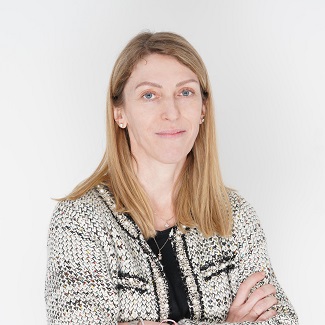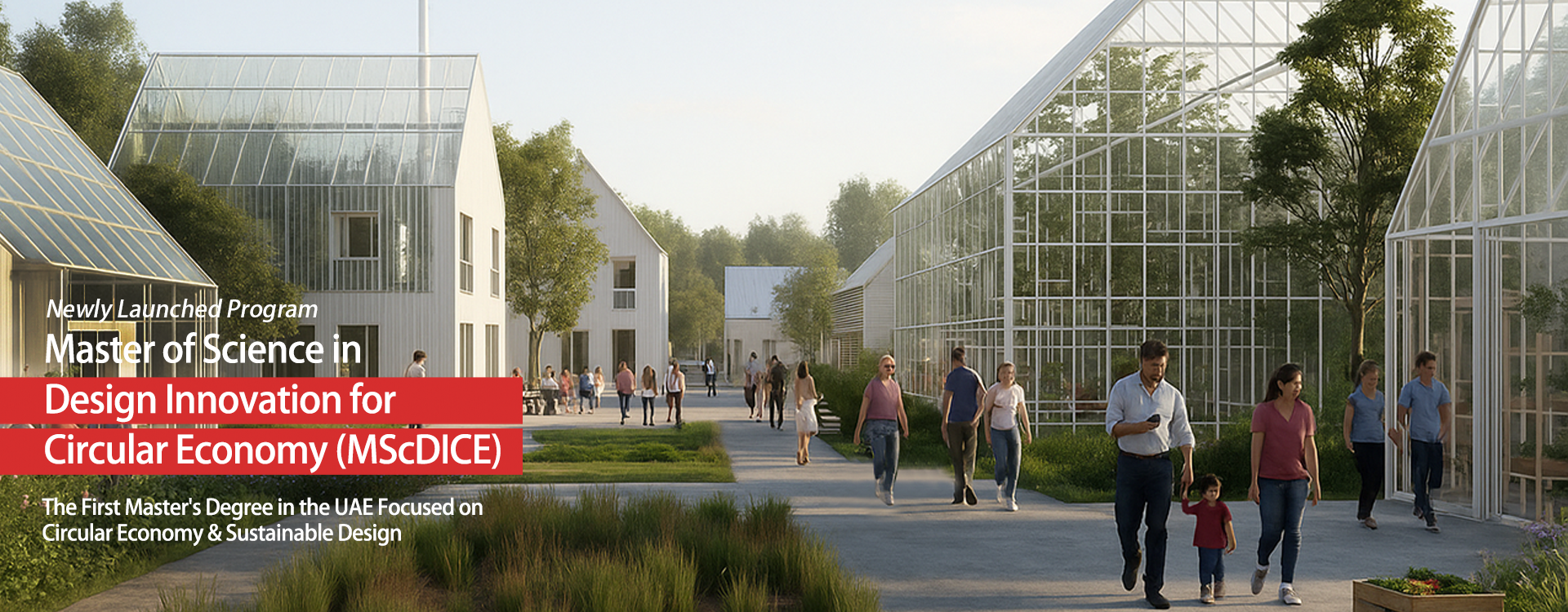Program Overview
The Master of Science in Design Innovation for Circular Economy (MScDICE) equips students with the knowledge and skills to lead sustainability transitions through design-driven strategies. Rooted in systems thinking, policy innovation, and circular economy principles, the program empowers graduates to tackle complex environmental and social challenges by developing regenerative solutions across products, services, buildings, and urban systems. Through interdisciplinary coursework and project-based learning, students explore the intersections of design, business, technology, and governance—preparing for impactful careers in sustainability consulting, innovation strategy, policy development, and circular design leadership.
Benefits
In a world facing urgent environmental and social challenges, there is growing demand for professionals who can lead innovation toward sustainable and circular solutions. The MSc in Design Innovation for Circular Economy prepares students to be at the forefront of this transition, equipping them with the tools to rethink products, services, buildings, urban systems, and policies through the lens of regeneration and circularity. As the UAE shifts its focus toward a knowledge-based, innovation-driven economy—prioritizing sustainable development, green technologies, and circular practices—graduates of this program will be well-positioned to contribute meaningfully across a range of sectors, from design and policymaking to urban development and sustainable business. The program cultivates cross-disciplinary fluency, enabling students to bridge the gap between design, technology, and governance, and become key players in shaping a resilient future.
Career Opportunities
Graduates of this program will have a wealth of industries to choose from and often go on to become:
- Lead Designer – Sustainability Specialist in Architecture, Interior, and Design Firms: Playing a pivotal role in guiding architectural, interior, and multidisciplinary design practices toward regenerative, low-impact, and circular solutions.
- Circular Economy Consultant: Advising businesses, governments, and organizations on strategies to implement circular models, reduce waste, and optimize resource flows.
- Sustainability Innovation Manager: Leading sustainable product and service innovation within corporations, NGOs, or start-ups.
- Design Strategist: Integrating circular principles into product/service design and business development processes.
- Urban Sustainability Advisor: Supporting municipalities and urban developers in circular urban planning, infrastructure retrofitting, and climate-responsive design.
- Policy Analyst / Advisor (Sustainability & Circular Economy): Working with public institutions or international organizations to shape policy frameworks that support circular and regenerative systems.
- Environmental Impact Analyst / Lifecycle Analyst: Specializing in Life Cycle Assessment (LCA), material flow analysis, and metrics for circularity to evaluate environmental impacts.
- Innovation Lab Coordinator / Research Fellow: Collaborating with research centers, universities, or think tanks on advancing circular economy knowledge and applications.
- Sustainable Product Manager: Overseeing the development and lifecycle of sustainable and circular products, from concept to end-of-life strategies.
- Corporate Social Responsibility (CSR) Lead: Driving CSR initiatives focused on circular economy and sustainable innovation.
- Green Entrepreneurship / Start-up Founder: Launching and scaling circular economy-driven businesses, especially in fields like fashion, food, packaging, or built environment.
- Design Researcher / Systems Designer: Conducting research and creating interventions at the intersection of design, ecology, and economics.
- Materials Innovation Specialist: Working with bio-based, recycled, or circular materials in industries like fashion, construction, or packaging.
- Sustainable Supply Chain Analyst: Mapping and redesigning supply chains to embed transparency, circularity, and resilience.
Graduates can also pursue advanced studies, such as a PhD in Design Innovation or related fields, to specialize further and enhance career prospects, including academic and high-level research roles.
The program has been awarded the accreditation by Ministry of Higher Education and Scientific Research, UAE on March 25, 2025.
The MScDICE program, tailored to align with the contemporary QFEmirates Level-9 strands, prioritizes market relevance. The educational aims of the program are:
- Develop a deep understanding of the human-driven climate crisis as a critical threat to the planet’s sustainability.
- Foster transdisciplinary approaches within the global design industry to create effective and sustainable mitigation and adaptation strategies.
- Gain expertise in the core principles, strategies, and tools of the Circular Economy to drive sustainable development.
- Understand the transition from linear to circular production models to support innovative and sustainable design practices and decision-making.
- Build a strong awareness that humanity’s survival and prosperity depend on living in harmony with nature and prioritizing sustainability.
- Engage in Circular Economy-driven entrepreneurial projects that create new pathways, processes, and methods for a more sustainable future.
Upon successful completion of the Master of Science in Design Innovation for Circular Economy, the graduates of the program will be able to:
- PLO 1: Demonstrate an in-depth understanding of Climate Crisis as a human-led threat to our planet and a design by-product.
- PLO 2: Discuss Design as a human values-driven activity that significantly impacts our lives and the natural world.
- PLO 3: Appraise how transitioning from linear consumption patterns to circular ones through the Circular Economy can mitigate the Climate Crisis.
- PLO 4: Apply circular economy principles and methods to developing diverse design strategies for business and entrepreneurship, upholding the ecosystem's balance and promoting a sustainable, equitable, and resilient future.
- PLO 5: Implement innovative pathways, processes, methods, and data use to design environments, activities, and products that consider the directives of the Circular Economy and the threads of the Climate Crisis.
- PLO 6: Apply cutting-edge computational tools and methods to mine, analyze, and manage complex data, to implement Circular Economy principles in designing environments, activities, and products.
- PLO 7: Integrate critical and speculative design thinking to forge innovative projects rooted in the Circular Economy.
- PLO 8: Recognize as part of the professional ethos the concern of living in harmony with nature as a condition of humanity's survival and prosperity.
The MScDICE program is being offered at the CUD Campus as a full-time flexible evening and weekend study mode program. The program is completed in 3 semesters (1+1/2 academic years) and the maximum duration of completion of the program is three academic years.
The MScDICE degree shall be awarded to a student upon completing the following requirements:
- A student enrolled in the MScDICE program must have passed 33 credit hours.
- A student must have achieved a CGPA of not less than 3.0 on a scale of 4.0 points.
- A student must have earned at least 75% of credits at CUD.
- The Applied Research Project must be completed at CUD.

Dr. Simona Azzali
Associate Professor
Email: simona.azzali@cud.ac.ae
Phone: +971(04)7096247
Office: HUB First Floor - Office 43
Program Structure
The MScDICE program is structured into three key components: Core Courses, Electives, and Applied Research Project, totaling 33 credit hours.
Core Courses (21 Cr. Hr.) form the foundation of the program, offering essential knowledge and skills critical to the field. These courses provide students with a solid understanding of key concepts and theories, preparing them for more specialized study and practical application.
Electives (06 Cr. Hr.) offer students the flexibility to explore areas of personal interest or specialization. These courses allow for deeper exploration into specific topics, helping students tailor their education to their career aspirations.
The Applied Research Project (06 Cr. Hr.) represents the final phase of the program, where students apply their learning to real-world research or projects. This component develops their research, problem-solving, and analytical skills, culminating in a comprehensive project or dissertation.
In total, the program requires 33 credit hours, ensuring a balanced mix of theoretical knowledge, specialized expertise, and practical research experience.
| Requirements | Compulsory Credit Hours |
Elective Credit Hours |
Total Credit Hours |
|---|---|---|---|
| Program Core Requirements (Core Courses) | 21 | 6 | 27 |
| Applied Research Project | 6 | - | 6 |
| Total | 27 | 6 | 33 |
| Course Code | Course Title | Prerequisite | Credit Hours | |
|---|---|---|---|---|
| DCE | 611 | Design-Out Climate | none | 3 |
| DCE | 612 | Principles of Circular Economy | none | 3 |
| DCE | 613 | Design Futures | none | 3 |
| DCE | 614 | Research by Design | none | 3 |
| DCE | 621 | Lifecycle Assessment and Circular Metrics | DCE 612 | 3 |
| DCE | 622 | Regenerative Buildings and Cities | DCE 611, DCE 612, DCE 614 | 3 |
| DCE | 623 | Sustainable Design Policy and Governance | DCE 612, DCE 613 | 3 |
|
Elective Courses (06 Credits): Students are required to select Two Courses from the following courses |
||||
| DCE | 624 | Design Industry Revolution | DCE 613 | 3 |
| DCE | 625 | Applied Environmental Science | DCE 611 | 3 |
| DCE | 626 | Impacts of Climate Change Policy on Environmental Management | DCE 611, DCE 612 | 3 |
| DCE | 627 | Technical and Scientific Methodologies in Circular Economy | DCE 612, DCE 614 | 3 |
| DCE | 628 | Smart Technologies and AI for Circular Economy | DCE 612, DCE 614 | 3 |
| Course Code | Course Title | Prerequisite | Credit Hours | |
|---|---|---|---|---|
|
Compulsory Courses (33 Credits) |
||||
| DCE | 630 | Applied Research Project | Completion of 24 Cr. Hrs. | 6 |
